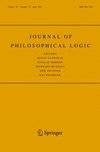Ab Esse ad Posse Non Valet Consequentia
IF 0.7
1区 哲学
0 PHILOSOPHY
引用次数: 0
Abstract
While knowledge of mere possibilities is difficult to understand, knowledge of possibilities that are actual seems unproblematic (as far as we know the actual world). The principle that what is actual is possible has been near-universally accepted. After summarizing some sporadic dissent, I present a proposal for how the validity of the principle might be restricted. While the principle certainly holds for sufficiently inclusive objective and epistemic possibilities, it may not hold when the accessibility of possibilities is contextually restricted.
Ab Esse ad Posse Non Valet Consequentia
虽然关于单纯可能性的知识难以理解,但关于实际可能性的知识似乎不成问题(就我们对实际世界的了解而言)。现实的就是可能的 "这一原则几乎已被普遍接受。在总结了一些零星的不同意见之后,我就如何限制该原则的有效性提出了一个建议。虽然该原则对于具有足够包容性的客观可能性和认识论可能性肯定是成立的,但当可能性的可及性受到语境限制时,它可能就不成立了。
本文章由计算机程序翻译,如有差异,请以英文原文为准。
求助全文
约1分钟内获得全文
求助全文
来源期刊

JOURNAL OF PHILOSOPHICAL LOGIC
PHILOSOPHY-
CiteScore
2.50
自引率
20.00%
发文量
43
期刊介绍:
The Journal of Philosophical Logic aims to provide a forum for work at the crossroads of philosophy and logic, old and new, with contributions ranging from conceptual to technical. Accordingly, the Journal invites papers in all of the traditional areas of philosophical logic, including but not limited to: various versions of modal, temporal, epistemic, and deontic logic; constructive logics; relevance and other sub-classical logics; many-valued logics; logics of conditionals; quantum logic; decision theory, inductive logic, logics of belief change, and formal epistemology; defeasible and nonmonotonic logics; formal philosophy of language; vagueness; and theories of truth and validity. In addition to publishing papers on philosophical logic in this familiar sense of the term, the Journal also invites papers on extensions of logic to new areas of application, and on the philosophical issues to which these give rise. The Journal places a special emphasis on the applications of philosophical logic in other disciplines, not only in mathematics and the natural sciences but also, for example, in computer science, artificial intelligence, cognitive science, linguistics, jurisprudence, and the social sciences, such as economics, sociology, and political science.
 求助内容:
求助内容: 应助结果提醒方式:
应助结果提醒方式:


